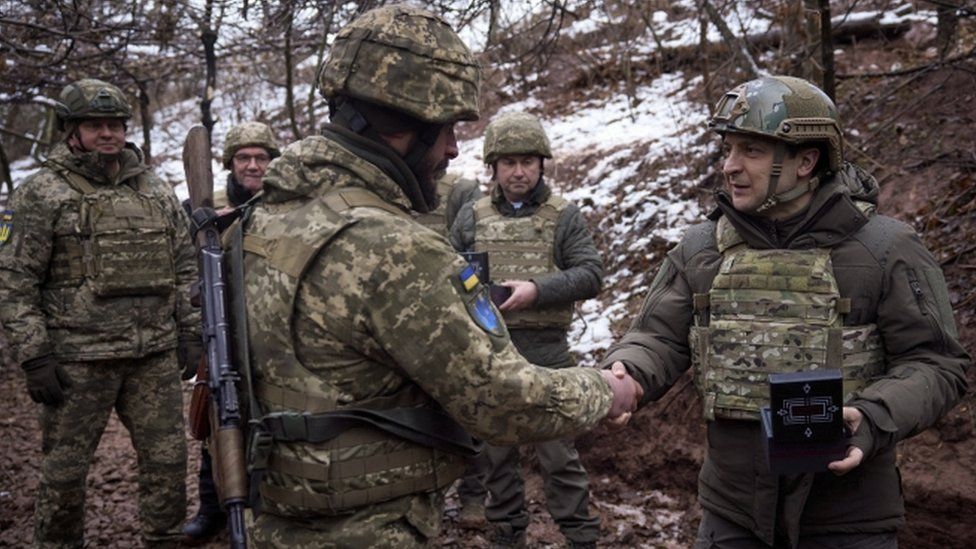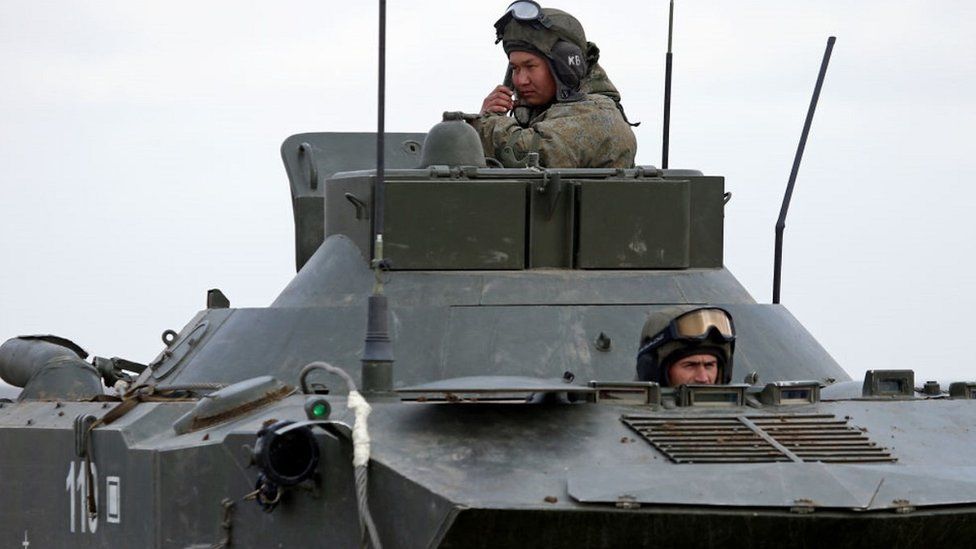Ukraine's Tense Standoff : Russia/NATO/US
"We can continue this dialogue. It seems to me that's the main thing.""Russia will prepare its considerations literally within the next days, within a week, and we'll pass them on to the American side for consideration.""We cannot help but be concerned about the prospects of Ukraine possibly joining NATO, because this would undoubtedly be followed by the placement of relevant military contingents, bases and weapons threatening us."Russian President Vladimir Putin"I made [it] very clear if in fact he invades Ukraine, there will be severe consequences, severe consequences, economic consequences like ones he's never seen.""His immediate response was he understood that."U.S. President Joe Biden
 |
| Russian President Vladimir Putin during a ceremony at the Kremlin's Alexander Hall in Moscow, on December 1, 2021. (Photo by Grigory SYSOYEV / SPUTNIK / AFP) |
U.S.
Intelligence is convinced that the Russian troop buildup on the border
between Ukraine and Russia portends Russia's inevitable invasion of the
country that was once an integral part of the Soviet Union. Ukraine has
already had a bitter taste of the Kremlin's intentions, in the Donbass,
eastern Ukraine where ethnic Russian Ukrainians declared their
allegiance to Russia and a civil war was initiated. President Putin lost
no time annexing the Crimean peninsula, and though Russia has always
denied having any of its military deployed in training and fighting
alongside the insurgents, their presence is undeniable.
Some
years back President Putin, nostalgic for the days of the USSR, invaded
Georgia and annexed two of its provinces, the world yawned and
expressed both surprise and censure. Russia's more recent muscle-flexing
and the alarm felt in the Baltic countries since 2014 that have no wish
to return to their former state of Russian control and the loss of
their sovereignty has drawn NATO into the picture, promising to protect
Ukraine against a full-scale invasion by Russia, though the U.S. made it
clear there would be no troop commitment from them.
Other
NATO members, however, have deployed their military in a number of
former Soviet satellite nations both to train their militaries and to
leave the indelible message that Ukraine is not alone. Now, following
the two-hour video meeting between the American and Russian presidents,
further economic sanctions were threatened should Russia make its move,
as seems inevitable. Ironically, the current contretemps between Russia
and NATO which may turn into an actual confrontation, had its
counterpart in reverse during the Cuban Missile Crisis.
"You know, it really could come to that [the tense occasion in 1962 during the Cold War between the United States and the Soviet Union, in Cuba when then-President John F. Kennedy and then-President Nikita Khrushchev, as much as dared one another into a nuclear standoff].""If things continue as they are, it is entirely possible by the logic of events to suddenly wake up and see yourself in something similar."Deputy Foreign Minister Sergei Ryabkov
There
does seem, at certain points, and the current situation is one of them,
that the world stands on the brink of all-out war, at a time when
formidably destructive weapons are in protagonists' hands. The Russian
statement that escalating tensions over Ukraine could lead to a more
serious, wider outbreak of hostilities bringing in much of Europe and
beyond, seems feasible. During the Cuban Missile Crisis it was the USSR
that had stationed Soviet nuclear missiles on the island. This was
clearly American geographic territory.
Leading
the United States to bring in a naval blockade in prevention of Moscow
shipping additional missiles to the Caribbean, and the demand that the
ones in place be removed. Now it is NATO -- where the alliance, in
assuring Ukraine, not yet a NATO country, but aspiring to join the
27-member group with its one-for-all, all-for-one military credo --
that might consider deploying missiles in Ukraine, right next to, and
targeting Russia. If Russia has nightmare scenarios keeping it awake at
night, this eventuality might very well be the crown of them.
 |
| Ukrainian President Volodymyr Zelensky on the front line on 6 December EPA |
Ukraine,
on the other hand, has good reason to fear an invasion by the tens of
thousands Russian troops gathered in proximity to its borders. An
ominous gathering that the Kremlin insists is simply a defensive move,
with no offensive intention whatever. Kyiv now has its expectations that
Western military allies will support it in this obviously threatening
situation, irrespective of the American position of not sending in its
troops but relying primarily on economic consequential threats. And the
possibility that the EU might agree painfully on stopping Russia's new
gas pipeline to Europe.
President
Biden, in the meanwhile, has unilaterally discussed with allies the
potential for a meeting between Russia and NATO countries for the
purpose of discussing the concerns expressed by Moscow and possible
methods of "bringing down the temperature on the eastern front".
A meeting of obvious great importance to all sides, but one which the
U.S. administration somehow overlooked first discussing with Moscow.
When
Kremlin spokesman Dmitry Peskov was asked would Russia object to the
participation of other NATO members in such a gathering, he responded, "We cannot say, because there is no understanding of how all this will be arranged".
 |
| Russian exercises in Crimea in March 2021 triggered widespread concerns in the West Getty Images |
"I am confident that true sovereignty of Ukraine is possible only in partnership with Russia. Our spiritual, human and civilizational ties formed for centuries and have their origins in the same sources, they have been hardened by common trials, achievements and victories. Our kinship has been transmitted from generation to generation. It is in the hearts and the memory of people living in modern Russia and Ukraine, in the blood ties that unite millions of our families. Together we have always been and will be many times stronger and more successful. For we are one people.""Today, these words may be perceived by some people with hostility. They can be interpreted in many possible ways. Yet, many people will hear me. And I will say one thing – Russia has never been and will never be ”anti-Ukraine“. And what Ukraine will be – it is up to its citizens to decide."Russian President Vladimir Putin “On the historical unity of Russians and Ukrainians”
Labels: Invasion NATO, Putin/Biden Russia Ukraine, United States

<< Home